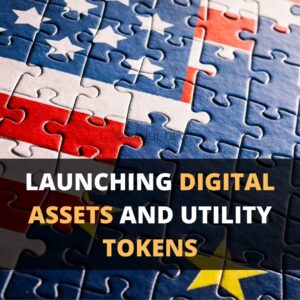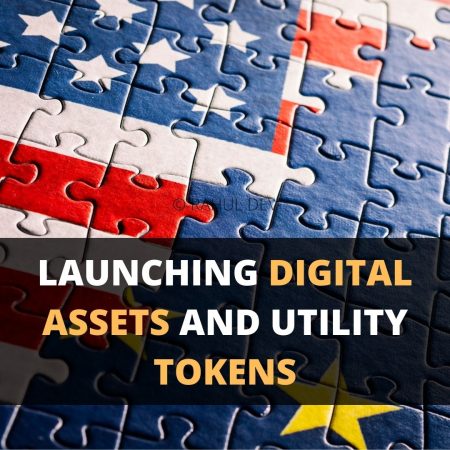Token Launch Projects
Explore the Technology and Business Landscape

Understand Practical Aspects
Understand how Utility Tokens are Launched for Digital Assets

Explore the Technology and Business Landscape

Understand how Utility Tokens are Launched for Digital Assets

Protect your innovations across multiple countries and create strong patent portfolio to boost business valuation
Local and global brand protection through international trademark registrations
Extensive research and business writing for technical whitepapers and B2B content products
The growth of digital finance has seen a significant transformation with the introduction of digital assets, including cryptocurrencies, stablecoins, non-fungible tokens (NFTs), central bank digital currencies (CBDCs), and security tokens. At its core, the concept of digital assets represents any value or medium of exchange created and exchanged on a blockchain, a peer-to-peer network that securely records information.
For token projects aimed at Launching Digital Assets and Utility Tokens in EU and UK, one needs to blend into the rapidly growing world of digital finance, focusing on the challenges associated with digital assets like cryptocurrencies, stablecoins, NFTs, CBDCs, and security tokens. This article provides a nuanced understanding of the diverse types of digital assets and their role in reshaping the global financial landscape, emphasizing their capacity to democratize investments and enhance transactional transparency through blockchain technology. The article further examines the evolving regulatory frameworks within the EU and UK, particularly highlighting the impact of the MiCA regulation and the UK’s post-Brexit approach to utility tokens. It also explores the practical applications of these digital assets in various sectors and the strategic considerations necessary for successful token launches. Key aspects such as patent strategies, global trademark and branding, and the legalities involved in tokenization processes are thoroughly analyzed. This article is aimed to serve as an essential resource for understanding the dynamics of digital assets and utility tokens in the EU and UK, offering valuable insights for investors, businesses, and regulators navigating this rapidly evolving digital landscape to execute swift token launch steps.
This article covers following topics:
Role of Tokens in Global Financial Landscape
Understanding Digital Assets and Utility Tokens
Utility Tokens in the EU Market
UK’s Approach to Utility Tokens Post-Brexit
Practical Applications and Business Strategies for Token Projects
Investing in Digital Assets and Utility Tokens
Blockchain Technology and Its Role in Digital Assets
Patent Strategy in Digital Assets and Utility Tokens
Global Trademark and Branding Strategy for Token Projects
Examination of Tokenization Processes and Regulations
Legal Agreements Needed for Token Launch

The various types of digital assets include, Cryptocurrencies that represent digital currencies like Bitcoin and Ethereum, serving as investments, payments, and project funding tools. The Stablecoins represent cryptocurrencies pegged to fiat currencies or commodities, facilitating payments and cross-border transactions. At the same time, NFTs are the tokens representing unique digital items, such as art or identity, enabling ownership and trade of virtual items. On the other hand, CBDCs represent digital currencies backed by central banks, not universally issued but significant for payments and transfers. In contrast, security tokens are the digital versions of traditional securities like stocks and bonds, offering tokenized real-world assets. In use, the storage and transaction of these assets are enabled through blockchain technology, with each transaction recorded on a public ledger and accessed through secure keys stored in digital wallets.
The global market capitalization of cryptocurrencies surpassed $2 trillion in 2021, indicating the growing significance of digital assets in the financial sector. This expansion is not merely about their value as assets but their functionality in revolutionizing financial markets. Digital tokens, in particular, are redefining finance by streamlining processes, increasing liquidity, and offering greater accessibility through fractional ownership. The use of smart contracts while preparing for token launch and during token transactions automates much of the buying and selling process, reducing intermediaries and costs. Blockchain technology provides an immutable record of ownership, enhancing the transparency of transactions. The digital assets enable investment in smaller portions of assets, democratizing access to investments traditionally reserved for the financially affluent. The future of digital assets is intertwined with the development of new types of securities and expansion into various tangible and intangible assets as approached during token launch process. Government and institutional support, particularly in regions like Singapore, is pivotal in fostering ecosystems that enable the thriving of digital assets.
Additionally, the integration of digital assets into global financial systems is essential for their broader impact. Initiatives like Project Dunbar demonstrate the potential for digital assets to transform international settlements and streamline cross-border payments, significantly reducing costs and enhancing efficiency. As digital assets and utility tokens continue to evolve and integrate into the global financial landscape, their potential to redefine the traditional financial ecosystem becomes increasingly evident. This guide aims to delve deeper into their mechanics, applications, and regulatory environment, offering a comprehensive understanding of their role in EU, UK, and global markets for token launch projects.
As Digital Assets are known to include a broad range of assets minted and exchanged on a blockchain, including cryptocurrencies, stablecoins, NFTs, CBDCs, and security tokens. They are characterized by their storage and recording on blockchain ledgers and are accessible through secure keys stored in digital wallets. The period between 2016 and 2018 saw significant investment in Initial Coin Offerings (ICOs), followed by a sell-off and the emergence of staking in decentralized finance (DeFi) platforms. Europe has witnessed a surge in regulatory initiatives like the MiCA, aiming to harmonize the regulatory framework for crypto assets.
The EU market has experienced a shift from the unregulated era of Initial Coin Offerings (ICOs) to a more regulated environment, with the introduction of laws like Malta’s Virtual Financial Assets (VFA) Act and the European Commission’s MiCA regulations. The Markets in Crypto-Assets Regulation (MiCAR) aims to regulate the issuance and trading of crypto-assets, as well as the management of underlying assets when applicable. The regulation is intended to promote innovation and the use of crypto-assets while ensuring a safe and secure market.
As per the key aspects of the MiCAR regulation, the crypto-assets are defined as payment tokens, investment tokens, and utility tokens, wherein utility tokens enable access to specific products or services. In terms of scope, the regulation covers issuers of utility tokens, asset-referenced tokens, and stablecoins. Also, MiCA does not apply to utility tokens that provide access to an existing good or service, enabling the holder to collect the goods or use the services. However, exemptions do not apply if utility tokens are used for fundraising or when the MiCA introduces a single set of common rules applicable to persons engaging in the issuance, offer to the public, and admission to trading of crypto-assets. The issuers of significant Asset-Referenced Tokens (ARTs) or Electronic Money Tokens (EMTs) will be subject to additional prudential requirements, such as liquidity management policy, stress-tests, adoption of a remuneration policy promoting effective risk management, and enhanced supervision by the European Banking Authority (EBA) and national competent authorities. Essentially, crypto-asset services can only be provided within the EU by legal entities that have a registered address in the EU. The authorization is granted by the national supervisory authorities of the registered seat of the issuer, allowing them to offer their crypto-assets throughout the Union.
The UK’s approach for reviewing the token launch projects within the UK involves regulating a broad suite of cryptoasset activities, including exchange, custody, and lending activities, with an emphasis on consumer protection and market integrity. While detailed research on this aspect is performed in a custom manner for each project that pertains to launch of tokens in the UK, a general comparison would involve analyzing how different regions are adopting and integrating digital assets within their financial systems, considering aspects like consumer protection, market integrity, and innovation.
Digital assets and utility tokens are increasingly being used in finance, retail, and technology sectors. Tokenization of real-world assets (RWA) is gaining traction among financial service providers to resolve inefficiencies in traditional securities settlement. Integrating digital assets into existing business models involves understanding their potential for streamlining transactions, enhancing security, and providing new opportunities for consumer engagement. A step-by-step blueprint to understand token launch framework would involve assessing the business’s current infrastructure, identifying potential use cases, and implementing a phased approach to integration. A case study on successful implementation in a major EU corporation could focus on entities like Societe Generale and JP Morgan, which have used tokenized financial instruments in institutional DeFi use cases.
The digital asset industry has attracted significant investment, even amid financial uncertainties. This continued influx of capital demonstrates a growing recognition of the potential offered by blockchain technology and digital assets. Traditional financial institutions are increasingly integrating cryptocurrency and digital asset services, suggesting a broadening acceptance of these technologies beyond traditional financial services. The digital asset market, characterized by high volatility, presents unique risks and opportunities. The disparity in market participants’ expectations, as evidenced by price fluctuations in cryptocurrencies like Bitcoin, highlights the need for robust risk management strategies. Institutions should align their digital asset exposure with their overall risk management frameworks.
With a view to achieve successful token launch strategy, a proactive engagement with blockchain technology can enhance risk management processes, helping mitigate potential market dislocations. The digital asset market is evolving, with trends like the tokenization of real-world assets creating new investment avenues. However, investors should be cautious of market overheating and the potential for dislocations. An analysis of the 2022 ‘crypto winter’ reveals the importance of applying core principles of risk management. Systemic and idiosyncratic risks, similar to those in traditional finance, have manifested in the digital asset market, leading to significant investor losses.
Blockchain and DLT platforms are transitioning from early adoption stages, marked by limited interoperability and scalability, to more mature phases. These technologies are fundamentally altering business operations across various industries, enhancing the management of digital assets. The development of non-public and permissioned networks provides more secure and trusted environments for transacting digital assets. Innovations in cryptographic processes are enhancing transaction verification, reducing energy consumption, and lowering transaction fees. New platforms like Polkadot and Cosmos are enabling better interoperability and scalability, essential for enterprise adoption of blockchain technology. These developments support diverse use cases and help in building foundational infrastructures. The dynamic nature of the digital asset market, coupled with evolving blockchain technologies, offers both challenges and opportunities. The future of digital assets and blockchain technology appears promising, with potential for significant impacts across various sectors. Organizations need to stay informed about technological advancements and regulatory developments to effectively navigate this evolving landscape and opt for efficient token launch processes.
A patent strategy for digital assets projects and a patent strategy for utility token projects cover thorough review of the unique aspects of each project at the time of token launch. At the stage of patent drafting and writing, it becomes crucial to assess the nuances of patent drafting and writing specific to digital assets and utility tokens. This includes understanding the unique aspects of these technologies from invention disclosure documents that must be considered in the patent process. As a core part of IP Strategy, it involves considering how IP can protect innovations in blockchain, tokenization, and related technologies. During token launch and immediately after the launch of tokens, the founders need to liaison between different stakeholders for coordinating between inventors, management, and external patent counsel, especially in the complex and interdisciplinary field of digital assets.
To expand the scope of utility tokens across global markets, the next stage involves a review of challenges and strategies for filing patents internationally in the context of global digital asset markets and diverse regulatory environments. At this stage, with a view to boost the commercial gains from various assets of the token projects, the next step involves understanding the valuation of patents in this sector, considering the dynamic and often speculative nature of digital technologies.
The token launch timeline and roadmap is generally in sync with the process of filing trademarks internationally in the context of digital assets and utility tokens, considering the legal and strategic complexities. Along with filing various trademarks to protect the brand names across various countries, with a view to multiply the value of the brand associated with the token launch, the project owners and stakeholders need to review various methods and importance of valuing trademarks and brands in blockchain sector, along with a thorough understanding the role of brand equity in the digital asset market. These strategies should align with current global trends in technology and innovation, especially in the context of the rapidly evolving digital asset market. It is equally important to examine the implications of these strategies for startups and established enterprises venturing into digital assets and blockchain technology.
With a view to achieve a successful launch of token projects, as discussed hereinabove, the initial phase is aimed at completing the development and implementation of token projects, including the various types of tokens such as utility tokens, security tokens, and their applications. The vital role of Token Legal Opinions during the token listing process covers various legal considerations for token projects, including the necessity and process of obtaining legal opinions, and the intricacies involved in token listing, especially on exchanges like KuCoin. At this stage, it becomes crucial to focus on various investor agreements and DAO structuring and to review the coverage of investor agreements like SAFT, and the legal and operational structure of Decentralized Autonomous Organizations (DAOs) in the context of token projects. In use, the insights on Web3 business models and the economics of tokenization (tokenomics) also help in assessing their practicality and impact on the digital asset ecosystem.
The token launch projects usually need various legal agreements, focusing on their specific roles and implications in digital asset projects. This includes understanding of each type of agreement (MoUs, partnership agreements, terms of use, privacy policies, investment agreements, development agreements) that contributes to the legal and operational structure of digital asset ventures. These agreements are critical for establishing a robust legal framework and operational strategy for digital asset ventures by ensuring regulatory compliance, managing risks, and facilitating strategic partnerships and collaborations.

As a business coach and thought leader, I cannot emphasize enough the importance of innovation, new software patents, mobile apps, and patents for tech companies, startups, and entrepreneurs. The world is rapidly evolving, and staying ahead of the curve is vital for success. Embracing technological advancements such as blockchain and AI can unlock unprecedented opportunities, streamline operations, and propel businesses into the future with competitive valuation via intangible assets.
Click Here for AI Startup Valuation Guide.
For instance, blockchain technology can revolutionize supply chain management and secure data sharing wherein innovative business models are explained to the audience via technical whitepapers, while AI can automate and optimize decision-making processes. Mobile apps are no longer just a luxury; they have become essential tools for engaging customers and offering personalized experiences. Furthermore, securing digital innovation patents is crucial for protecting intellectual property, fostering innovation, and maintaining a competitive edge. By investing in these areas, businesses can position themselves as industry pioneers and pave the way for a prosperous future after thoroughly conducting the due diligence and reviewing the legal opinion letters, which in case of digital assets can assist in determining the tokens as utility assets or coins as utility tokens before listing the assets at an exchange.
Our team of advanced patent attorneys assists clients with patent searches, drafting patent applications, and patent (intellectual property) agreements, including licensing and non-disclosure agreements. Advocate Rahul Dev is a Patent Attorney & International Business Lawyer practicing Technology, Intellectual Property & Corporate Laws. He is reachable at rd (at) patentbusinesslawyer (dot) com & @rdpatentlawyer on Twitter.
Quoted in and contributed to 50+ national & international publications (Bloomberg, FirstPost, SwissInfo, Outlook Money, Yahoo News, Times of India, Economic Times, Business Standard, Quartz, Global Legal Post, International Bar Association, LawAsia, BioSpectrum Asia, Digital News Asia, e27, Leaders Speak, Entrepreneur India, VCCircle, AutoTech).
Regularly invited to speak at international & national platforms (conferences, TV channels, seminars, corporate trainings, government workshops) on technology, patents, business strategy, legal developments, leadership & management.
Working closely with patent attorneys along with international law firms with significant experience with lawyers in Asia Pacific providing services to clients in US and Europe. Flagship services include international patent and trademark filings, patent services in India and global patent consulting services.
Global Blockchain Lawyers (www.GlobalBlockchainLawyers.com) is a digital platform to discuss legal issues, latest technology and legal developments, and applicable laws in the dynamic field of Digital Currency, Blockchain, Bitcoin, Cryptocurrency and raising capital through the sale of tokens or coins (ICO or Initial Coin Offerings).
Blockchain ecosystem in India is evolving at a rapid pace and a proactive legal approach is required by blockchain lawyers in India to understand the complex nature of applicable laws and regulations.